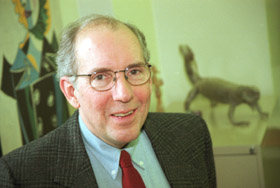
| ||
 | ||
 Professor Kerry McSweeney PHOTO: OWEN EGAN |
Sensuous Scribes
|
MARIA FRANCESCA LoDICO | "How sense luscious the world is," says Diane Ackerman in A Natural History of the Senses. "We need to return to feeling the textures of life. Much of our experience in twentieth-century America is an effort to get away from those textures, to fade into a stark, simple, solemn, puritanical all-business routine that doesn't have anything so unseemly as sensuous zest."
Kerry McSweeney, McGill's Molson professor of English, may jokingly describe himself as a "decrepit" 58-year-old, but he's got Ackerman's sensual zest. His book, The Language of the Senses--Sensory-Perceptual Dynamics in Wordsworth, Coleridge, Thoreau, Whitman, and Dickinson (McGill-Queen's University Press), offers sensory profiles of Romantic writers. His close readings and textual analysis argue that sensory-perceptual acuity deeply affected these writers' powers of symbolic perception. "Responses to the natural world are important in many 19th-century poems. The book offers new ways of talking about these works and understanding them better through the relation between sensory-perceptual dynamics and the writer's creative power," says McSweeney. Touch is dominant in the poetry of Walt Whitman, a sexy poet who "wrote in the white heat of intensity poems like 'I Sing the Body Electric,'" says McSweeney. "The dominant sense in Whitman's work is touch, including his proprioceptive sense of his own body. Studying the interactions of touch and the other senses makes possible fresh readings of his major poems, including 'Song of Myself' and 'When Lilacs Last in the Dooryard Bloom'd,' two of the greatest in the canon of American literature." In the book's preface, McSweeney writes: "In Words-worth's "Prelude," for example, the dynamic interplay of eye and ear is a fundamental constituent of the 'spots of time' and related experiences and thus has an important bearing on one of the most contentious areas in Wordsworth criticism: the mind/nature dialectic." McSweeney's book was a finalist for the Humanities and Social Sciences Federation of Canada's prestigious Raymond Klibansky Prize for best work in the Humanities. McSweeney has also written seven other books, including Supreme Attachments--Studies in Victorian Love Poetry (Ashgate, 1998). He taught at Queen's University for 18 years before joining McGill in 1985. According to McSweeney, Henry David Thoreau's journals are a case study of how sensory-perceptual experience functions as a source of imaginative power. "Thoreau wrote in his journal every day. He must have written over two million words, describing his walks, the differences in landscape during day and night, what effect the moonlight had on landscapes, the sound of crickets and hundreds of other details," says McSweeney. "He made a compelling discovery. When he got near crickets, those closest to him stopped chirping. So it's a sound in the distance, coming from the crickets farther away. That sound in the distance was very evocative to Thoreau. "The great tragedy in his life is that as his senses began to decay, so did the connection felt between that inner and outer life." McSweeney also suggests that exotropia (being wall-eyed), the severe eye disorder from which Emily Dickinson suffered, was as important a determinant of her creative life as gender. Much has been made of Dickinson's fear of public places that resulted in the poet regularly sequestering herself in her room. Most recent scholarship has been feminist criticism treating Dickinson's agoraphobia as a strategic withdrawal that enabled her to write in a patriarchal society. "The poet's relationship to the natural world is one of her central poetic subjects," says McSweeney. As this suggests, The Language of the Senses offers an alternative to New Historicist critical readings that study a writer's work solely as part of its social and cultural context. McSweeney says that perception in general and vision in particular have become distrusted. Rather, language and interpretation are central. "Like my subjects, I 'believe' in perception and the referential capacities of language," he says. In the classroom, McSweeney's approach to literature has a similar emphasis. He offers the following anecdote: in one of his Victorian Poetry classes, a female student said she was excited about taking the course because she wanted to work on the female poets of the period. "I said 'no,' explaining there were other English courses that featured feminist approaches and that we would be doing her a disservice if we didn't encourage her to study literature from a variety of points of view. She stormed out and I never saw her again," he says, chuckling.
|
|
| |||||